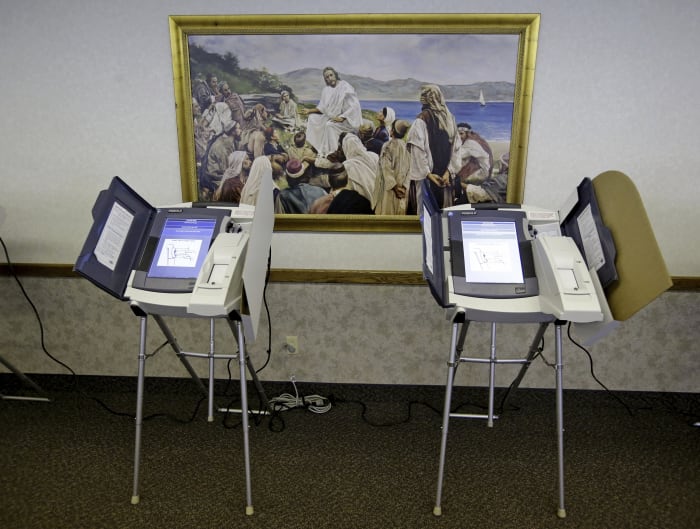
PHOENIX – Vice President Kamala Harris is intensifying her efforts to connect with voters who are part of the Church of Jesus Christ of Latter-day Saints, enlisting influential members of the faith to highlight in crucial Arizona that Donald Trump does not uphold the values of the church.
Her campaign in the state revealed an advisory committee on Thursday to formalize the outreach to existing and former members of the church, commonly known as the Mormon church.
Arizona is home to nearly 450,000 church members, comprising about 6% of the state’s population. With such a significant presence, Latter-day Saints and ex-church members could play a pivotal role in what is expected to be a tightly contested race.
Latter-day Saints have traditionally leaned towards the Republican party, consistent with the broader GOP coalition. While they have been influential in Republican strongholds and local politics across the West, their impact on national elections has been limited. In the 2020 elections, around 70% of Mormon voters nationwide supported Trump, while roughly one-quarter backed Democrat Joe Biden.
Harris’ primary objective is to prevent Trump from securing substantial support from demographic groups favoring him. Although she may not secure a majority of Latter-day Saint votes, gaining even a small fraction could be instrumental in a state known for closely contested elections. Biden’s victory margin in 2020 was just under 10,500 votes, while Democratic Attorney General Kris Mayes won by a mere 280 votes in 2022.
Latter-day Saints supporting Harris in Arizona are making a faith-based appeal for endorsing the Democratic ticket, emphasizing the church’s belief that the U.S. Constitution is divinely inspired.
“The Constitution is a fundamental aspect of our faith, and voting for individuals who have shown disrespect for it goes against our values,” stated Joel John, a former Republican state legislator who will co-chair the committee. “We cannot support someone who attempted to undermine it on Jan. 6.”
Although the Salt Lake City-based church does not endorse candidates or political parties, John highlighted the importance for Latter-day Saints to vote for politicians who embody goodness, honesty, and wisdom, qualities perceived to be lacking in Trump, transcending any policy differences they may have with Harris.
While Trump has garnered support from conservative religious voters over time, he has struggled to win over Latter-day Saints. Many members of the church find Trump’s use of crude language and derogatory remarks towards women and minorities to be at odds with the church’s principles of humility, morality, and compassion.
Arizona’s Mormon community is concentrated in the East Valley of metro Phoenix, a suburban area where voters have rejected Trump-backed Republicans, contributing to the state’s shift from reliably GOP to a battleground. Mesa, Arizona’s third-largest city, owes its origins to a settlement founded by Mormon pioneers in the 1800s.
Efforts to appeal to Latter-day Saints are not new for Democrats. In 2016, Hillary Clinton drew parallels between Trump’s anti-Muslim immigration stance and historical religious persecution against Mormons. In contrast, Joe Biden invested in organizing church members in the 2020 elections, a strategy Kamala Harris is currently pursuing.
Despite the prevailing social expectation for church members to align with conservative ideals, Harris has a chance to engage younger Latter-day Saints, who, like the broader population, are more diverse. Brittany Romanello, an anthropologist at Arizona State University, highlighted that Mormons often base their voting decisions on moral values rather than strict party affiliation.
Copyright 2024 The Associated Press. All rights reserved. This material may not be published, broadcast, rewritten or redistributed without permission.






